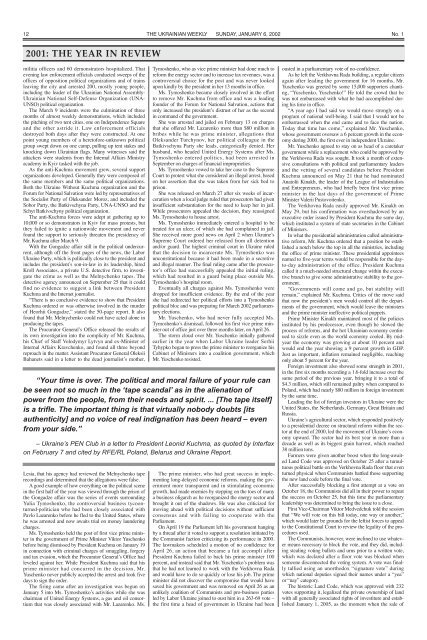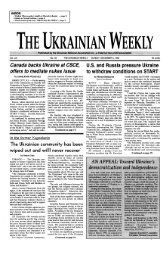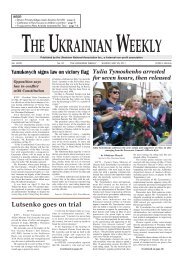1_January 6, 2002 - The Ukrainian Weekly
1_January 6, 2002 - The Ukrainian Weekly
1_January 6, 2002 - The Ukrainian Weekly
Create successful ePaper yourself
Turn your PDF publications into a flip-book with our unique Google optimized e-Paper software.
12 THE UKRAINIAN WEEKLY SUNDAY, JANUARY 6, <strong>2002</strong><br />
No. 1<br />
2001: THE YEAR IN REVIEW<br />
militia officers and 60 demonstrators hospitalized. That<br />
evening law enforcement officials conducted sweeps of the<br />
offices of opposition political organizations and of trains<br />
leaving the city and arrested 200, mostly young people,<br />
including the leader of the <strong>Ukrainian</strong> National Assembly-<br />
<strong>Ukrainian</strong> National Self-Defense Organization (UNA-<br />
UNSO) political organization.<br />
<strong>The</strong> March 9 incidents were the culmination of three<br />
months of almost weekly demonstrations, which included<br />
the pitching of two tent cities, one on Independence Square<br />
and the other astride it. Law enforcement officials<br />
destroyed both days after they were constructed. At one<br />
point young members of a heretofore-unknown political<br />
group swept down on one camp, pulling up tent stakes and<br />
knocking down <strong>Ukrainian</strong> flags. Many witnesses said the<br />
attackers were students from the Internal Affairs Ministry<br />
academy in Kyiv tasked with the job.<br />
As the anti-Kuchma movement grew, several support<br />
organizations developed. Generally they were composed of<br />
the same members and the same political organizations.<br />
Both the Ukraine Without Kuchma organization and the<br />
Forum for National Salvation were led by representatives of<br />
the Socialist Party of Oleksander Moroz, and included the<br />
Sobor Party, the Batkivschyna Party, UNA-UNSO and the<br />
Schyt Batkivschyny political organization.<br />
<strong>The</strong> anti-Kuchma forces were adept at gathering up to<br />
10,000 or so demonstrators in Kyiv for mass protests, but<br />
they failed to ignite a nationwide movement and never<br />
found the support to seriously threaten the presidency of<br />
Mr. Kuchma after March 9.<br />
With the Gongadze affair still in the political undercurrent,<br />
although off the front pages of the news, the Labor<br />
Ukraine Party, which is politically close to the president and<br />
includes the president’s son-in-law in its leadership, hired<br />
Kroll Associates, a private U.S. detective firm, to investigate<br />
the crime as well as the Melnychenko tapes. <strong>The</strong><br />
detective agency announced on September 25 that it could<br />
find no evidence to suggest a link between President<br />
Kuchma and the Internet journalist.<br />
“<strong>The</strong>re is no conclusive evidence to show that President<br />
Kuchma ordered or was otherwise involved in the murder<br />
of Heorhii Gongadze,” stated the 50-page report. It also<br />
found that Mr. Melnychenko could not have acted alone in<br />
producing the tapes.<br />
<strong>The</strong> Procurator General’s Office released the results of<br />
its own investigation into the complicity of Mr. Kuchma,<br />
his Chief of Staff Volodymyr Lytvyn and ex-Minister of<br />
Internal Affairs Kravchenko, and found all three beyond<br />
reproach in the matter. Assistant Procurator General Oleksii<br />
Bahanets said in a letter to the dead journalist’s mother,<br />
Tymoshenko, who as vice prime minister had done much to<br />
reform the energy sector and to increase tax revenues, was a<br />
controversial choice for the post and was never looked<br />
upon kindly by the president in her 13 months in office.<br />
Ms. Tymoshenko became closely involved in the effort<br />
to remove Mr. Kuchma from office and was a leading<br />
founder of the Forum for National Salvation, actions that<br />
only increased the president’s distrust of her as the second<br />
in command of the government.<br />
She was arrested and jailed on February 13 on charges<br />
that she offered Mr. Lazarenko more than $80 million in<br />
bribes while he was prime minister, allegations that<br />
Oleksander Turchynov, her political colleague in the<br />
Batkivschyna Party she leads, categorically denied. Her<br />
husband, who headed United Energy Systems after Ms.<br />
Tymoshenko entered politics, had been arrested in<br />
September on charges of financial improprieties.<br />
Ms. Tymoshenko vowed to take her case to the Supreme<br />
Court to protest what she considered an illegal arrest, based<br />
on her assertion that she was taken from her sick bed to<br />
prison.<br />
She was released on March 27 after six weeks of incarceration<br />
when a local judge ruled that prosecutors had given<br />
insufficient substantiation for the need to keep her in jail.<br />
While prosecutors appealed the decision, they reassigned<br />
Ms. Tymoshenko to house arrest.<br />
Ms. Tymoshenko immediately entered a hospital to be<br />
treated for an ulcer, of which she had complained in jail.<br />
She received more good news on April 2 when Ukraine’s<br />
Supreme Court ordered her released from all detention<br />
and/or guard. <strong>The</strong> highest criminal court in Ukraine ruled<br />
that the decision to incarcerate Ms. Tymoshenko was<br />
unconstitutional because it had been made in a secretive<br />
and illegal manner. <strong>The</strong> final ruling came after the prosecutor’s<br />
office had successfully appealed the initial ruling,<br />
which had resulted in a guard being place outside Ms.<br />
Tymoshenko’s hospital room.<br />
Eventually all charges against Ms. Tymoshenko were<br />
dropped for insufficient evidence. By the end of the year<br />
she had redirected her political efforts into a Tymoshenko<br />
political bloc and was preparing for March <strong>2002</strong> parliamentary<br />
elections.<br />
Mr. Yuschenko, who had never fully accepted Ms.<br />
Tymoshenko’s dismissal, followed his first vice prime minister<br />
out of office just over three months later, on April 26.<br />
<strong>The</strong> storm cloud over Mr. Yuschenko initially gathered<br />
earlier in the year when Labor Ukraine leader Serhii<br />
Tyhypko began to press the prime minister to reorganize his<br />
Cabinet of Ministers into a coalition government, which<br />
Mr. Yuschenko resisted.<br />
“Your time is over. <strong>The</strong> political and moral failure of your rule can<br />
be seen not so much in the ‘tape scandal’ as in the alienation of<br />
power from the people, from their needs and spirit. ... [<strong>The</strong> tape itself]<br />
is a trifle. <strong>The</strong> important thing is that virtually nobody doubts [its<br />
authenticity] and no voice of real indignation has been heard – even<br />
from your side.”<br />
– Ukraine’s PEN Club in a letter to President Leonid Kuchma, as quoted by Interfax<br />
on February 7 and cited by RFE/RL Poland, Belarus and Ukraine Report.<br />
Lesia, that his agency had reviewed the Melnychenko tape<br />
recordings and determined that the allegations were false.<br />
A good example of how everything on the political scene<br />
in the first half of the year was viewed through the prism of<br />
the Gongadze affair was the series of events surrounding<br />
Yulia Tymoshenko, the controversial business tycoonturned-politician<br />
who had been closely associated with<br />
Pavlo Lazarenko before he fled to the United States, where<br />
he was arrested and now awaits trial on money laundering<br />
charges.<br />
Ms. Tymoshenko held the post of first vice prime minister<br />
in the government of Prime Minister Viktor Yuschenko<br />
before being dismissed by President Kuchma on <strong>January</strong> 19<br />
in connection with criminal charges of smuggling, forgery<br />
and tax evasion, which the Procurator General’s Office had<br />
leveled against her. While President Kuchma said that his<br />
prime minister had concurred in the decision, Mr.<br />
Yuschenko never publicly accepted the arrest and took five<br />
days to sign the order.<br />
<strong>The</strong> firing came after an investigation was begun on<br />
<strong>January</strong> 5 into Ms. Tymoshenko’s activities while she was<br />
chairman of United Energy Systems, a gas and oil consortium<br />
that was closely associated with Mr. Lazarenko. Ms.<br />
<strong>The</strong> prime minister, who had great success in implementing<br />
long-delayed economic reforms, making the government<br />
more transparent and in stimulating economic<br />
growth, had made enemies by stepping on the toes of many<br />
a business oligarch as he reorganized the energy sector and<br />
brought it out of the shadows. He was also criticized for<br />
moving ahead with political decisions without sufficient<br />
consensus and with failing to cooperate with the<br />
Parliament.<br />
On April 19 the Parliament left his government hanging<br />
by a thread after it voted to support a resolution initiated by<br />
the Communist faction criticizing its performance in 2000.<br />
<strong>The</strong> lawmakers scheduled a motion of no confidence for<br />
April 26, an action that became a fait accompli after<br />
President Kuchma failed to back his prime minister 100<br />
percent, and instead said that Mr. Yuschenko’s problem was<br />
that he had not learned to work with the Verkhovna Rada<br />
and would have to do so quickly or lose his job. <strong>The</strong> prime<br />
minister did not discover the compromise that would have<br />
saved his government and was removed on April 26 as an<br />
unlikely coalition of Communists and pro-business parties<br />
led by Labor Ukraine joined to oust him in a 263-69 vote –<br />
the first time a head of government in Ukraine had been<br />
ousted in a parliamentary vote of no-confidence.<br />
As he left the Verkhovna Rada building, a regular citizen<br />
again after leading the government for 16 months, Mr.<br />
Yuschenko was greeted by some 15,000 supporters chanting,<br />
“Yuschenko, Yuschenko!” He told the crowd that he<br />
was not embarrassed with what he had accomplished during<br />
his time in office.<br />
“A year ago I had said we would move strongly on a<br />
program of national well-being. I said that I would not be<br />
embarrassed when the end came and to face the nation.<br />
Today that time has come,” explained Mr. Yuschenko,<br />
whose government oversaw a 6 percent growth in the economy<br />
during 2000, the first ever in independent Ukraine.<br />
Mr. Yuschenko agreed to stay on as head of a caretaker<br />
government while a replacement who could be approved by<br />
the Verkhovna Rada was sought. It took a month of extensive<br />
consultations with political and parliamentary leaders<br />
and the vetting of several candidates before President<br />
Kuchma announced on May 21 that he had nominated<br />
Anatolii Kinakh, the leader of the League of Industrialists<br />
and Entrepreneurs, who had briefly been first vice prime<br />
minister in the last days of the government of Prime<br />
Minister Valerii Pustovoitenko.<br />
<strong>The</strong> Verkhovna Rada easily approved Mr. Kinakh on<br />
May 29, but his confirmation was overshadowed by an<br />
executive order issued by President Kuchma the same day,<br />
which instituted a system of state secretaries in the Cabinet<br />
of Ministers.<br />
In what the presidential administration called administrative<br />
reform, Mr. Kuchma ordered that a position be established<br />
a notch below the top in all the ministries, including<br />
the office of prime minister. <strong>The</strong>se presidential appointees<br />
named to five-year terms would be responsible for the dayto-day<br />
administration of the office. President Kuchma<br />
called it a much-needed structural change within the executive<br />
branch to give some administrative stability to the government.<br />
“Governments will come and go, but stability will<br />
remain,” explained Mr. Kuchma. Critics of the move said<br />
that now the president’s men would control all the departments<br />
of the government, which would leave the ministers<br />
and the prime minister ineffective political puppets.<br />
Prime Minister Kinakh maintained most of the policies<br />
instituted by his predecessor, even though he slowed the<br />
process of reforms, and the hot <strong>Ukrainian</strong> economy continued<br />
to sizzle even as the world economy cooled. By midyear<br />
the economy was growing at about 10 percent and<br />
would end the year showing a 9 percent growth in GDP.<br />
Just as important, inflation remained negligible, reaching<br />
only about 5 percent for the year.<br />
Foreign investment also showed some strength in 2001,<br />
in the first six months recording a 1.6-fold increase over the<br />
same period of the previous year, bringing it to a total of<br />
$4.3 million, which still remained paltry when compared to<br />
Poland, which had nearly $80 million in foreign investment<br />
by the same time.<br />
Leading the list of foreign investors in Ukraine were the<br />
United States, the Netherlands, Germany, Great Britain and<br />
Russia.<br />
Ukraine’s agricultural sector, which responded positively<br />
to a presidential decree on structural reform within the sector<br />
at the end of 2000, led the movement of Ukraine’s economy<br />
upward. <strong>The</strong> sector had its best year in more than a<br />
decade as well as its biggest grain harvest, which reached<br />
38 million tons.<br />
Farmers were given another boost when the long-awaited<br />
Land Code was approved on October 25 after a tumultuous<br />
political battle on the Verkhovna Rada floor that even<br />
turned physical when Communists battled those supporting<br />
the new land code before the final vote.<br />
After successfully blocking a first attempt at a vote on<br />
October 18, the Communists did all in their power to repeat<br />
the success on October 25, but this time the parliamentary<br />
leadership was determined to bring the issue to a close.<br />
First Vice-Chairman Viktor Medvedchuk told the session<br />
that “We will vote on this bill today, one way or another,”<br />
which would later be grounds for the leftist forces to appeal<br />
to the Constitutional Court to review the legality of the procedures<br />
used.<br />
<strong>The</strong> Communists, however, were inclined to use whatever<br />
means necessary to block the vote, and they did, including<br />
stealing voting ballots and urns prior to a written vote,<br />
which was declared after a floor vote was blocked when<br />
someone disconnected the voting system. A vote was finally<br />
tallied using an unorthodox “signature vote” during<br />
which national deputies signed their names under a “yea”<br />
or “nay” category.<br />
<strong>The</strong> historic Land Code, which was approved with 232<br />
votes supporting it, legalized the private ownership of land<br />
with all generally associated rights of investiture and established<br />
<strong>January</strong> 1, 2005, as the moment when the sale of

















